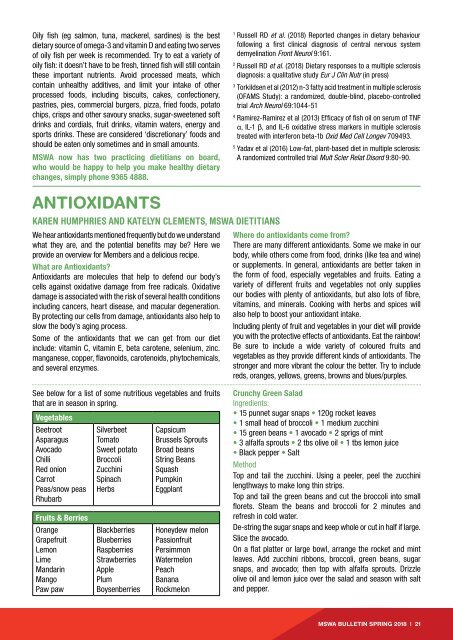Create successful ePaper yourself
Turn your PDF publications into a flip-book with our unique Google optimized e-Paper software.
Oily fish (eg salmon, tuna, mackerel, sardines) is the best<br />
dietary source of omega-3 and vitamin D and eating two serves<br />
of oily fish per week is recommended. Try to eat a variety of<br />
oily fish: it doesn’t have to be fresh, tinned fish will still contain<br />
these important nutrients. Avoid processed meats, which<br />
contain unhealthy additives, and limit your intake of other<br />
processed foods, including biscuits, cakes, confectionery,<br />
pastries, pies, commercial burgers, pizza, fried foods, potato<br />
chips, crisps and other savoury snacks, sugar-sweetened soft<br />
drinks and cordials, fruit drinks, vitamin waters, energy and<br />
sports drinks. These are considered ‘discretionary’ foods and<br />
should be eaten only sometimes and in small amounts.<br />
MSWA now has two practicing dietitians on board,<br />
who would be happy to help you make healthy dietary<br />
changes, simply phone 9365 4888.<br />
1<br />
Russell RD et al. (<strong>2018</strong>) Reported changes in dietary behaviour<br />
following a first clinical diagnosis of central nervous system<br />
demyelination Front Neurol 9:161.<br />
2<br />
Russell RD et al. (<strong>2018</strong>) Dietary responses to a multiple sclerosis<br />
diagnosis: a qualitative study Eur J Clin Nutr (in press)<br />
3<br />
Torkildsen et al (2012) n-3 fatty acid treatment in multiple sclerosis<br />
(OFAMS Study): a randomized, double-blind, placebo-controlled<br />
trial Arch Neurol 69:1044-51<br />
4<br />
Ramirez-Ramirez et al (2013) Efficacy of fish oil on serum of TNF<br />
α, IL-1 β, and IL-6 oxidative stress markers in multiple sclerosis<br />
treated with interferon beta-1b Oxid Med Cell Longev 709493.<br />
5<br />
Yadav et al (2016) Low-fat, plant-based diet in multiple sclerosis:<br />
A randomized controlled trial Mult Scler Relat Disord 9:80-90.<br />
ANTIOXIDANTS<br />
KAREN HUMPHRIES AND KATELYN CLEMENTS, MSWA DIETITIANS<br />
We hear antioxidants mentioned frequently but do we understand<br />
what they are, and the potential benefits may be? Here we<br />
provide an overview for Members and a delicious recipe.<br />
What are Antioxidants?<br />
Antioxidants are molecules that help to defend our body’s<br />
cells against oxidative damage from free radicals. Oxidative<br />
damage is associated with the risk of several health conditions<br />
including cancers, heart disease, and macular degeneration.<br />
By protecting our cells from damage, antioxidants also help to<br />
slow the body’s aging process.<br />
Some of the antioxidants that we can get from our diet<br />
include: vitamin C, vitamin E, beta carotene, selenium, zinc.<br />
manganese, copper, flavonoids, carotenoids, phytochemicals,<br />
and several enzymes.<br />
Where do antioxidants come from?<br />
There are many different antioxidants. Some we make in our<br />
body, while others come from food, drinks (like tea and wine)<br />
or supplements. In general, antioxidants are better taken in<br />
the form of food, especially vegetables and fruits. Eating a<br />
variety of different fruits and vegetables not only supplies<br />
our bodies with plenty of antioxidants, but also lots of fibre,<br />
vitamins, and minerals. Cooking with herbs and spices will<br />
also help to boost your antioxidant intake.<br />
Including plenty of fruit and vegetables in your diet will provide<br />
you with the protective effects of antioxidants. Eat the rainbow!<br />
Be sure to include a wide variety of coloured fruits and<br />
vegetables as they provide different kinds of antioxidants. The<br />
stronger and more vibrant the colour the better. Try to include<br />
reds, oranges, yellows, greens, browns and blues/purples.<br />
See below for a list of some nutritious vegetables and fruits<br />
that are in season in spring.<br />
Vegetables<br />
Beetroot<br />
Asparagus<br />
Avocado<br />
Chilli<br />
Red onion<br />
Carrot<br />
Peas/snow peas<br />
Rhubarb<br />
Fruits & Berries<br />
Orange<br />
Grapefruit<br />
Lemon<br />
Lime<br />
Mandarin<br />
Mango<br />
Paw paw<br />
Silverbeet<br />
Tomato<br />
Sweet potato<br />
Broccoli<br />
Zucchini<br />
Spinach<br />
Herbs<br />
Blackberries<br />
Blueberries<br />
Raspberries<br />
Strawberries<br />
Apple<br />
Plum<br />
Boysenberries<br />
Capsicum<br />
Brussels Sprouts<br />
Broad beans<br />
String Beans<br />
Squash<br />
Pumpkin<br />
Eggplant<br />
Honeydew melon<br />
Passionfruit<br />
Persimmon<br />
Watermelon<br />
Peach<br />
Banana<br />
Rockmelon<br />
Crunchy Green Salad<br />
Ingredients:<br />
• 15 punnet sugar snaps • 120g rocket leaves<br />
• 1 small head of broccoli • 1 medium zucchini<br />
• 15 green beans • 1 avocado • 2 sprigs of mint<br />
• 3 alfalfa sprouts • 2 tbs olive oil • 1 tbs lemon juice<br />
• Black pepper • Salt<br />
Method<br />
Top and tail the zucchini. Using a peeler, peel the zucchini<br />
lengthways to make long thin strips.<br />
Top and tail the green beans and cut the broccoli into small<br />
florets. Steam the beans and broccoli for 2 minutes and<br />
refresh in cold water.<br />
De-string the sugar snaps and keep whole or cut in half if large.<br />
Slice the avocado.<br />
On a flat platter or large bowl, arrange the rocket and mint<br />
leaves. Add zucchini ribbons, broccoli, green beans, sugar<br />
snaps, and avocado; then top with alfalfa sprouts. Drizzle<br />
olive oil and lemon juice over the salad and season with salt<br />
and pepper.<br />
MSWA BULLETIN SPRING <strong>2018</strong> | 21


















